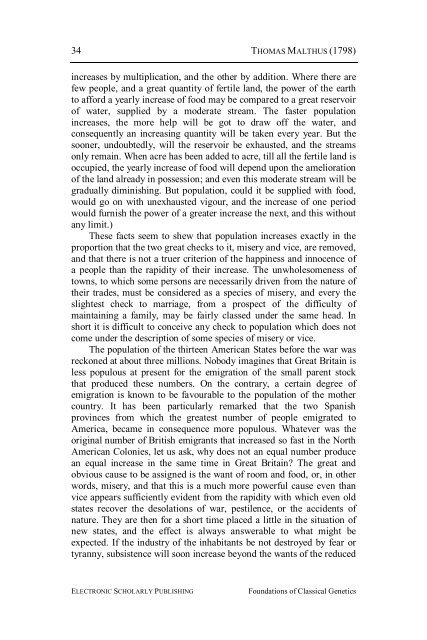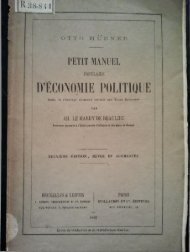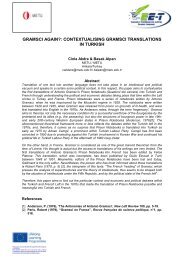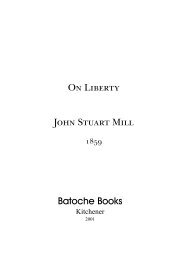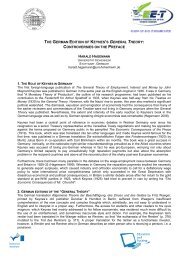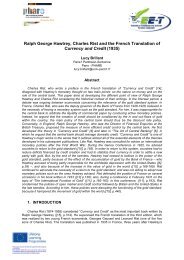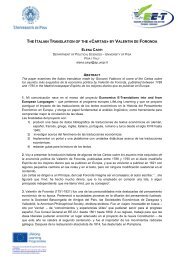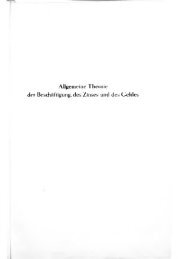Malthus, Thomas, Robert, An Essay on the Principle of Population ...
Malthus, Thomas, Robert, An Essay on the Principle of Population ...
Malthus, Thomas, Robert, An Essay on the Principle of Population ...
You also want an ePaper? Increase the reach of your titles
YUMPU automatically turns print PDFs into web optimized ePapers that Google loves.
34 THOMAS MALTHUS (1798)<br />
increases by multiplicati<strong>on</strong>, and <strong>the</strong> o<strong>the</strong>r by additi<strong>on</strong>. Where <strong>the</strong>re are<br />
few people, and a great quantity <strong>of</strong> fertile land, <strong>the</strong> power <strong>of</strong> <strong>the</strong> earth<br />
to afford a yearly increase <strong>of</strong> food may be compared to a great reservoir<br />
<strong>of</strong> water, supplied by a moderate stream. The faster populati<strong>on</strong><br />
increases, <strong>the</strong> more help will be got to draw <strong>of</strong>f <strong>the</strong> water, and<br />
c<strong>on</strong>sequently an increasing quantity will be taken every year. But <strong>the</strong><br />
so<strong>on</strong>er, undoubtedly, will <strong>the</strong> reservoir be exhausted, and <strong>the</strong> streams<br />
<strong>on</strong>ly remain. When acre has been added to acre, till all <strong>the</strong> fertile land is<br />
occupied, <strong>the</strong> yearly increase <strong>of</strong> food will depend up<strong>on</strong> <strong>the</strong> ameliorati<strong>on</strong><br />
<strong>of</strong> <strong>the</strong> land already in possessi<strong>on</strong>; and even this moderate stream will be<br />
gradually diminishing. But populati<strong>on</strong>, could it be supplied with food,<br />
would go <strong>on</strong> with unexhausted vigour, and <strong>the</strong> increase <strong>of</strong> <strong>on</strong>e period<br />
would furnish <strong>the</strong> power <strong>of</strong> a greater increase <strong>the</strong> next, and this without<br />
any limit.)<br />
These facts seem to shew that populati<strong>on</strong> increases exactly in <strong>the</strong><br />
proporti<strong>on</strong> that <strong>the</strong> two great checks to it, misery and vice, are removed,<br />
and that <strong>the</strong>re is not a truer criteri<strong>on</strong> <strong>of</strong> <strong>the</strong> happiness and innocence <strong>of</strong><br />
a people than <strong>the</strong> rapidity <strong>of</strong> <strong>the</strong>ir increase. The unwholesomeness <strong>of</strong><br />
towns, to which some pers<strong>on</strong>s are necessarily driven from <strong>the</strong> nature <strong>of</strong><br />
<strong>the</strong>ir trades, must be c<strong>on</strong>sidered as a species <strong>of</strong> misery, and every <strong>the</strong><br />
slightest check to marriage, from a prospect <strong>of</strong> <strong>the</strong> difficulty <strong>of</strong><br />
maintaining a family, may be fairly classed under <strong>the</strong> same head. In<br />
short it is difficult to c<strong>on</strong>ceive any check to populati<strong>on</strong> which does not<br />
come under <strong>the</strong> descripti<strong>on</strong> <strong>of</strong> some species <strong>of</strong> misery or vice.<br />
The populati<strong>on</strong> <strong>of</strong> <strong>the</strong> thirteen American States before <strong>the</strong> war was<br />
reck<strong>on</strong>ed at about three milli<strong>on</strong>s. Nobody imagines that Great Britain is<br />
less populous at present for <strong>the</strong> emigrati<strong>on</strong> <strong>of</strong> <strong>the</strong> small parent stock<br />
that produced <strong>the</strong>se numbers. On <strong>the</strong> c<strong>on</strong>trary, a certain degree <strong>of</strong><br />
emigrati<strong>on</strong> is known to be favourable to <strong>the</strong> populati<strong>on</strong> <strong>of</strong> <strong>the</strong> mo<strong>the</strong>r<br />
country. It has been particularly remarked that <strong>the</strong> two Spanish<br />
provinces from which <strong>the</strong> greatest number <strong>of</strong> people emigrated to<br />
America, became in c<strong>on</strong>sequence more populous. Whatever was <strong>the</strong><br />
original number <strong>of</strong> British emigrants that increased so fast in <strong>the</strong> North<br />
American Col<strong>on</strong>ies, let us ask, why does not an equal number produce<br />
an equal increase in <strong>the</strong> same time in Great Britain? The great and<br />
obvious cause to be assigned is <strong>the</strong> want <strong>of</strong> room and food, or, in o<strong>the</strong>r<br />
words, misery, and that this is a much more powerful cause even than<br />
vice appears sufficiently evident from <strong>the</strong> rapidity with which even old<br />
states recover <strong>the</strong> desolati<strong>on</strong>s <strong>of</strong> war, pestilence, or <strong>the</strong> accidents <strong>of</strong><br />
nature. They are <strong>the</strong>n for a short time placed a little in <strong>the</strong> situati<strong>on</strong> <strong>of</strong><br />
new states, and <strong>the</strong> effect is always answerable to what might be<br />
expected. If <strong>the</strong> industry <strong>of</strong> <strong>the</strong> inhabitants be not destroyed by fear or<br />
tyranny, subsistence will so<strong>on</strong> increase bey<strong>on</strong>d <strong>the</strong> wants <strong>of</strong> <strong>the</strong> reduced<br />
ELECTRONIC SCHOLARLY PUBLISHING<br />
Foundati<strong>on</strong>s <strong>of</strong> Classical Genetics


